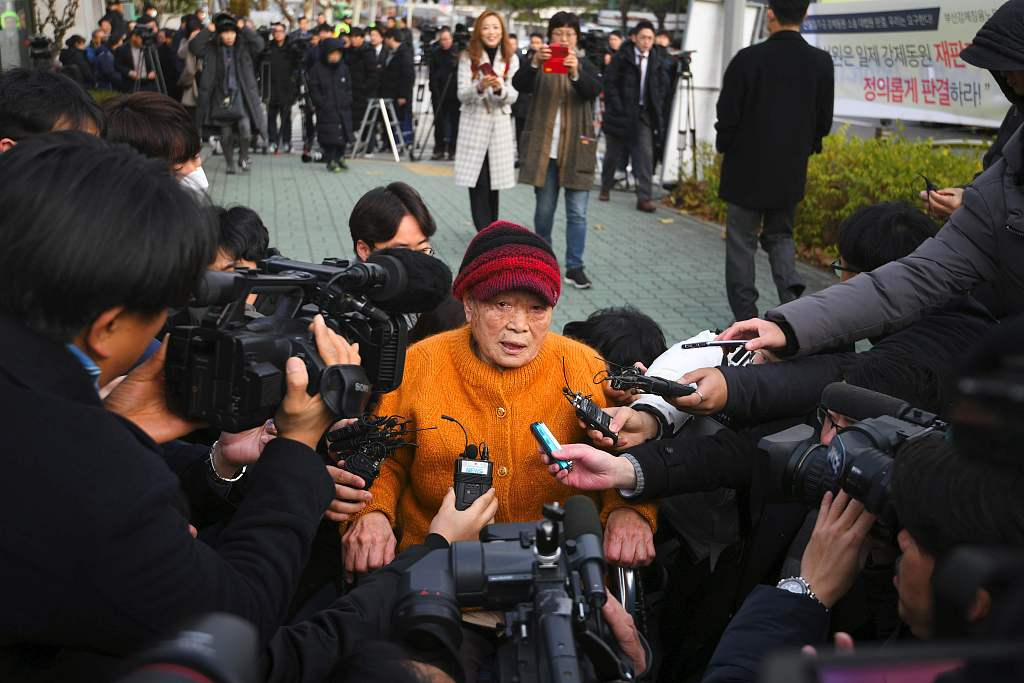

Editor's note: Chris Deacon is a postgraduate researcher in politics and international relations at the University of London and previously worked as an international commercial lawyer. The article reflects the author's opinions, and not necessarily the views of CGTN.
On August 2, the trade dispute between the Republic of Korea (ROK) and Japan worsened further as Japan confirmed the removal of the ROK from the former's "white list" of trusted trading partners. The ROK immediately condemned the move, threatening serious retaliatory measures.
Disputes between Japan and the ROK on a whole range of issues are nothing new; but their severity has increased in recent years and the current dispute has put bilateral relations in perhaps their most negative place in living memory.
Behind virtually every one of these disagreements is the legacy of difficult history between the two countries. Memory of Japan's colonization of the Korean Peninsula in the first half of 20th century and its conduct during the Pacific War has never left the collective Korean consciousness and still plays a vital role in ROK politics.
In Japan, too, the legacy of war memory has been a difficult hurdle to clear. Vestiges of this history are still frequently visible – be it at the controversial Yasukuni Shrine in Tokyo and its highly revisionist Yushukan museum, or in questionable statements made by conservative politicians about the "comfort women" issue.
The latest dispute has roots in this history also. While ostensibly Japan is removing the ROK from its white list for reasons of national security, in reality the measure is almost certainly retaliation for Seoul's refusal to block or speak out against the ruling of an ROK court that Korean victims of Japan's wartime forced labor may claim compensation from the private corporations which benefited from this labor.
As it has often done in the past – including in the comfort women dispute – Tokyo has pointed to the 1965 normalization treaty between the two countries as evidence that this, and most other issues, have already been settled fully and finally. Seoul argues, however, that the rights of individuals cannot be limited by such an agreement.

Kim Sung-joo (C), a victim of forced labour by Japan during its colonial rule of the Korean Peninsula from 1910 to 1945, is surrounded by reporters as she arrives at the Supreme Court in Seoul, November 29, 2018. /VCG Photo
Fuelling all this strife is a clash of emotion, identity and memory driven by politics. In the ROK (and to a large extent in the DPRK too), post-war Korean identity has taken strength from overcoming Japanese imperialism, with resistance fighters feted as heroes to the Korean nation. Japan is the essential "other" of Korean nationalism.
Given this, "Japan-bashing" can at times be used by Korean political elites to galvanize domestic support. While anti-Japanese rhetoric is often associated particularly with progressives in the ROK, conservatives have also engaged in this.
Former President Lee Myung-bak, for example, once landed on the disputed Dokdo territory, also named Takeshima by Japan, to burnish his anti-Japanese credentials after an angry public reaction to his plans to sign an intelligence-sharing agreement with Japan.
Japan, for its part, has always struggled to fully come to terms with the reality of its past. While initiatives to do just that have been plentiful, including myriad statements regarding and agreements with the ROK over the years, these have been consistently undermined by the words and conduct of some political elites who appear unwilling to fully accept and regret Japan's misdeeds.
Such conduct, in turn, is easy fodder for Korean nationalists to seize upon as evidence of Japan having never changed and posing the same threat that it always has. This results in a seemingly never-ending cycle of mutual antagonism.
To make matters worse, younger generations in both countries appear even more exasperated with one another. In Japan, young people feel overwhelmingly distant from their country's wartime past and are puzzled by the anti-Japanese sentiment across the sea, questioning why it is not possible to just "move on" from history.
But Koreans, young and old, do not see moving on as so easy. Sentiment regarding this difficult past feels as present as it ever has – provoked both by native political forces, but also by the conduct of conservative revisionists in Japan, who might not speak for the majority of Japanese, but nevertheless have a prominent platform and often speak incendiary words.

Japan's Prime Minister Shinzo Abe and South Korea's President Moon Jae-in at the G20 Summit in Osaka, Japan, June 28, 2019. /VCG Photo
While we can talk of an "identity clash" here, we must not be fatalistic. Concentrating only on identity in and of itself runs the risk of falling into a trap of essentialism – the idea that this is just how Koreans and Japanese are; a clash which exists by nature.
In reality, of course, identities, national and otherwise, are themselves social constructions; ones which are maintained, shaped and deployed by social and political forces.
Conscious efforts are currently being made on both sides to escalate this situation to the detriment of both countries, and indeed many others. It is of course the right of any country to serve what it believes to be its national interest, but it is difficult to see how either country or its people can benefit in any way from these disputes.
Partners, such as the United States, will try to intervene to improve the situation, as always. But there will ultimately be little that third parties can do to improve things. Complex ideational forces are at play, which may take generations to overcome. As a result, ROK-Japan relations may well get worse before they get better.
(If you want to contribute and have specific expertise, please contact us at opinions@cgtn.com)

Copyright © 2018 CGTN. Beijing ICP prepared NO.16065310-3
Copyright © 2018 CGTN. Beijing ICP prepared NO.16065310-3